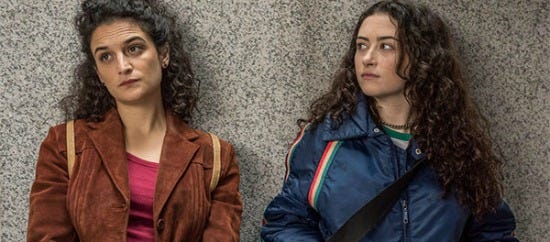Landline

Actress Jenny Slater reteams with her “Obvious Child” director / screenwriter, Gillian Robespierre, for another comically observational look at the trials of young womanhood.
“Landline” follows a twentysomething woman played by Slater toeing the precipice of marriage and concurrent anxiety about permanency, as well as her teenage sister caught in the phase of acting out and seeking all around her for meaning, and finding only disappointment in her immediate surroundings.
It's a smart, tender, wry and sensitive portrait of a family in turmoil. Edie Falco and John Turturro play the parents, harried in their own lives and bewildered by the two independent-minded women they’ve raised. They have their own problems as well, which Robespierre explores with co-screenwriter Elisabeth Holm, who also worked on the story for “Child.”
Set in 1995, the title refers to the numerous telephone conversations in the movie, before mobile phones were ubiquitous. Most of the impact interactions take place face-to-face, however, and “Landline” also speaks to the deeper connection the sisters form throughout the course of the story when circumstances throw them into unexpected proximity.
Slate plays Dana, who superficially seems pretty stable with a decent starter job, apartment and fiancé, Ben (Jay Duplass). They get on well together, but even before the wedding vows take place a sense of sameness has crept into the relationship. The sex has even gone stale, which they attempt to solve with an unfortunate change of locale. But Dana discovers deeper cravings she’s afraid will get stifled.
This leads to a flirtation with college flame Nate (Finn Wittrock), whose crooked smile and off-kilter regard for things like marriage and family personify Dana’s increasingly chilly feet.
Abby Quinn plays Ali, who’s about 16 but seems to have skipped over the teen angst phase and hurried straight into menopausal orneriness. Her dad, Alan (Turturro), jokes that maybe getting mugged will tame her nighttime wanderings, but then takes it back: Muggers would be too scared of her.
Ali is in a hurry: to grow up, to drink and do drugs, to lose her virginity, to go to college or whatever else it takes to get away from her parents as soon as possible. She has a guy she keeps around (Marquis Rodriguez) to help with her carnal explorations, but Ali treats him as an appliance to her own evolution.
One of the more interesting things about “Landline” is the way the women tend to use men poorly, rather than the other way around. Early on the girls discover love poetry written by their dad, an advertising copywriter and wannabe playwright, to a mysterious woman named “C.” They spend much of the movie trying to sniff out who that is — not quite believing such a self-doubting person would have the gumption to cheat.
They nurse their secret resentment for their dad, even as Dana carries out the exact same sort of duplicity, and Ali casually squashes her would-be boyfriend’s feelings when they intrude up on her plans.
Falco is the center of the clan as matriarch Pat, who has a very public position of power and employs a slightly softer version of that on the home front. In one scene she dismisses her husband as a “failure” in front of their daughter, and Turturro’s face is a mask of restrained pain. Pat’s not a bad person, but she’s been shouldering the parenting load for so long, she can’t help resent her floundering mate.
Things go on, with much pain as well as laughter. The appeal of “Landline” is its spot-on observation of characters who resemble real people rather than Hollywood constructs conveying themselves from Point A to B in the plot. These people knock around, sidestepping and backtracking, in a chaotic path that bends (hopefully) toward grace.



